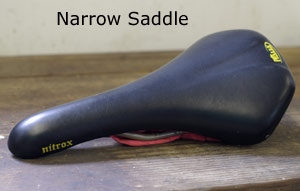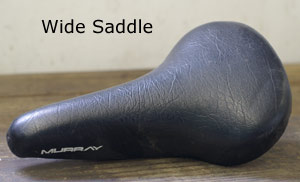To contribute to this wiki, please contact bikebikeeverywhere@gmail.com if you would like us to create you an account. The Contribute to this Wiki page goes into detail about how to make contributions and what information should be included.
Para contribuir a este wiki, por favor escribe a bikebikeeverywhere@gmail.com si deseas que creemos una cuenta para ti. La página Contribute to this Wiki explica en detalle cómo hacer contribuciones y qué información debe incluirse.
Seats
Seats aka Saddles are the things you sit on and attach to the seatpost.
Evaluating
Evaluating saddles is pretty simple. Unless you are a pack-rat, the simple question, would I use this? is a good indicator. Make sure they are in working order, here are some things to avoid:
Check for Rips
If the saddle has a fabric or leather covering, and there are any rips anywhere on it, it also goes into the "bad" pile.
Check the Rails
Flip the saddle over and look at the two metal rails. They should be solid. Grab each one and tug up and down like you're trying to pull it out of the saddle. If anything moves, the saddle is broken where the rail connects to the plastic shell.
Check the Plastic Shell
Get a good look at the plastic shell from the bottom, and if there are any cracks, it's broken. Try to flex the saddle a bit, and make sure you don't find any cracks that way.
Check the Springs
If the saddle has springs underneath, make sure that all of the bolts and nuts holding everything together are there. If anything is missing, the saddle is broken.
Sorting
Saddles are sorted according to condition,width, and attachment mechanism. Some saddles are very narrow with just a pair of rails on the bottom. Others may be wide with integrated springs and hardware for attaching to a seat post. These things are useful to know as a cyclist and mechanic, specifically with regard to matching a saddle to a bicycle. Saddles are designed not for different types of bicycles but for different types of riding. Narrow, hard saddles are designed for aggressive riding where the cyclist puts less weight on the saddle. Wider, softer, and more cushioned saddles are designed for more casual riding. You will usually only find springs on the widest, most casual saddles. The saddles designed for more aggressive riding are appropriate for high-performance bicycles, a medium sized saddle is good for most normal recreational, health, or transportational riding, and an extremely wide saddle is only suitable for riding "cruiser" style bicycles for slow speeds over short distances.
There are only two things you need to know to sort saddles: whether the saddle is ripped, and what other saddles it looks like. If it is ripped in any way or otherwise decently damaged, it goes in the free saddles box. If it is not, take it to the drawers where saddles are kept and find a box with saddles that look like it, and put it in that box. Examples of the three types of saddle can be seen here.
Spanish
Sillín (m)
Asiento (m)
|
Bicycle Parts |
|||||
| Ball Bearings • Brakes (Caliper Brakes, Cantilever Brakes & Disc Brakes) • Brake Levers • Chainrings • Chains • Cranks | |||||
| Derailers (Front & Rear) • Forks • Frame • Front Derailers • Handlebars • Hubs • Pedals • Quick Release | |||||
| Rim • Seatposts • Seats • Shifters • Skewer • Spokes • Stems • Tires • Tubes • Wheels |


